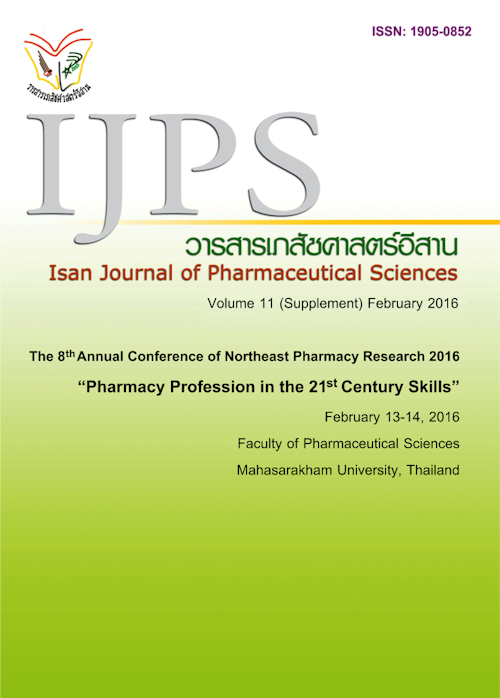Effect of Citrus grandis [L.] Osbeck on monoamine oxidase inhibitory activities and depressive behavioral assessment in mice
Main Article Content
Abstract
Introduction: Monoamine oxidase (MAO) is an enzyme that located in brain, liver at the outer
membranes and oxidized monoamine neurotransmitters. MAO has two isoenzymes, MAO-A and MAO-B.
MAO-A plays an important role in psychiatric disorder such as depression and MAO-B involved in neuronal
diseases such as Parkinson’s disease (PD) and Alzheimer’s diseases (AD). Monoamine hypothesis, one of
the most important causes in depressive disorder and MAO inhibitor is an antidepressant, which have many
side effects. Nowadays we look for antidepressant from natural product in order to reducing the unwanted
side effects and safety for long term treatment. Objective: This study aimed to investigate antidepressant-like
effect of the native economic fruit in Thailand, pomelo (Citrus grandis (L.) Osbeck), on monoamine oxidase
(MAO) inhibitory effect and using two acute animal models of depression, forced swimming test (FST) and tail
suspension test (TST). Materials and Methods: Three cultivars of pomelo, Tubtim Siam (TS), Thong-dee
(TD) and Kao-Nampueng (KN) were used in this study as monoamine oxidase (MAO) inhibitors. Mice were
administered the pomelo extract (250, 500 mg/kg, p.o.) and a reference antidepressant, imipramine (IMP, 20
mg/kg, i.p.) 1 hour before starting FST and TST to analyze depression-like behavior in ICR mice (Statistic:
One-Way ANOVA followed by the Student-Newman-Keulstest). Results: The results showed that 3 cultivars
of pomelo including TS, TD and KN inhibited the MAO-A activity with the IC50 values of 721.20±0.26,
426.68±0.33 and 1080±1.01 μg/ml and MAO-B activity with the IC50 values of 68.31±0.97, 144.51±0.31 and
749.31±1.12 μg/ml, respectively. In addition, only TS significantly decreased the immobility time in mice when
compare with control group in both TST and FST. Conclusion: The results of this study suggest that TS
ameliorated depressive-like symptom and the possible mechanism may be involve in its inhibitory effect on
monoamine oxidase enzymes.
Article Details
In the case that some parts are used by others The author must Confirm that obtaining permission to use some of the original authors. And must attach evidence That the permission has been included
References
Chatterjee M, Jaiswal M, Palit G. Comparative Evaluation of Forced Swim Test and Tail Suspension Test as Models of Negative Symptom of Schizophrenia in Rodents. International Scholarly Research Network. 2012.1-5.
Donato F, Gomes MG, Goes ATR, et al. Hesperidin exerts antidepressant-like effects in acute and chronic treatment in mice: Possible role of L-arginine-NOcGMP pathway and BDNF levels. Brain Research Bulletin.2014. 104, 19-26.
FIŠAR Z, HROUDOVÁ J, RABOCH J. Inhibition of monoamine oxidase activity by antidepressants and mood stabilizers. Neuroendocrinol Lett. 2010. 31(5), 645-656.
Gardana C, Gharnieri S, Riso P, Simonetti P, Porrini M. Flavanone plasma pharmacokinetics from blood orange juice in human. British Journal of Nutrition. 2007. 98, 165-172.
Guo C, Yang J, Wei J, Li Y, Xu J, Jiang Y. Antioxidant activities of peel, pulp and seed fractions of common fruits as determined by FRAP assay. Nutrition Research. 2003. 23, 1719-1726.
Kanaze F, Bounartzi M, Georgarakis M, Niopas I. Pharmacokinetics of citrus flavononeaglyconeshesperetin and naringenin after single oral administration in human subjects. European Journal of Chinical Nutrition. 2006. 61, 472-477.
Mäkynen K, Jitsaardkul S, Tachasamran P, et al. Cultivar variations in antioxidant and antihyperlipidemic properties of pomelo pulp (Citrus (Burm.) Merrill) in Thailand. Food Chemistry. 2013. 139, 735-743.
Mizuki D, Matsomoto K, Tanaka K, et al. Antidepressant-like effect of Butea superba in mice exposed to chronic mild stress and its possible mechanism of action. Journal of Ethnopharmacology. 2014. 156, 16-25.
Moallem SA, Hosscinzadeh H, Ghoncheh F. Evaluation of antidepressant effect of aerial parts of Echium vulgare on mice. Iran J Basic Med Sci.2007. 10, 189-196.
Monthakantirat O, Sukano W, Umehara K, Noguchi H, Chulikhit Y, Matsumoto K. Effect of miroestrol on ovariectomyinduced cognitive impairment and lipid peroxidation in mouse brain. Phytomedine. 2014. 21, 1249-1255.
Sakakibara H, Yoshino S, Kawai Y, Terao J. Antidepressant-like effect of onion (Allium cepaL.) powder in a rat behavior model of depression. Biosci. Biotechnol. Biochem. 2008. 72(1), 94-100.
Steru L, Chermat R, Thierry B, Simon P. The tail suspension test: a new method for screening antidepressants in mice. Psychopharmacology. 1985. 85, 367-370.
World Health Organization, World suicide prevention day 2012. http://www.who.int/mediacentre/events/annual/world_suicide_prevention_day/en/ Accessed 25.11.201


